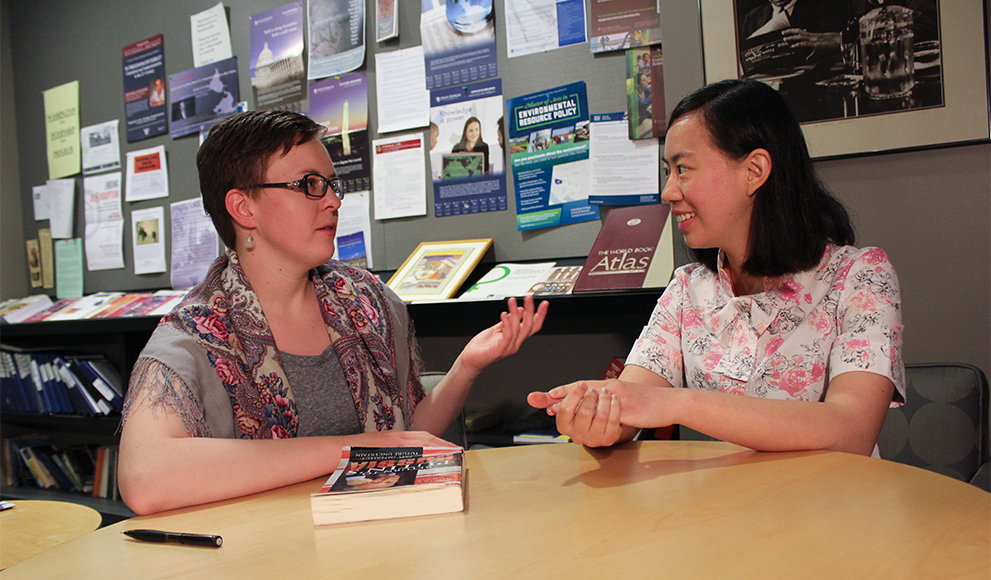Two Wellesley Students Named Carnegie Junior Fellows

Wellesley congratulates Wenyan Deng ’15 (pictured, right) and Margaret McClure ’15, who have both been named Carnegie Junior Fellows for 2015-16. In August they will join 10 other fellows—chosen from a pool of applicants who hail from 400 participating colleges—to work as research assistants at the Carnegie Endowment for International Peace. This is the first time two Wellesley candidates have been selected in one year.
As impressive as those numbers sound, Deng and McClure are more excited by the opportunity to help advance a greater understanding of China and Russia, respectively, at a time when both emerging superpowers are reshaping the global stage.
“As a Chinese national studying at Wellesley, I have always been interested in how my country interacts with the United States,” said Deng, who will focus on the changing dynamics between the United States and China. As a junior fellow, she hopes to answer two questions: “Is China a potential partner in development or a source of instability? And can the two countries work together to reduce the uncertainty and chaos we often see during power transitions?”
Deng, who has lived in Singapore and now calls Hong Kong home, brings great personal insight to her scholarship as an international relations major and a history minor. She studied abroad at the University of Cambridge (Pembroke College) in her junior year, and last summer she interned with ABC News in Beijing. There, she was often shocked by the negative comments people posted in response to the articles she wrote.
“Unreasonable fear can induce a self-fulfilling prophecy where a preemptive action by one group leads to escalation from all sides,” she said. “I hope to promote a better understanding of both countries that will reduce the tension in Sino-U.S. relations and give people a clearer perception of the challenges and opportunities we face.”
The liberal arts education Deng received at Wellesley has prepared her for Carnegie and beyond, she believes, by acquainting her with a wide range of disciplines—including history, economics, and astronomy—and making her a more well-rounded researcher. Her experience as a 2015 Albright fellow has also broadened the way she views international issues, by teaching her to “work with different types of thinkers.”
For McClure, a Russian and political science major, the junior fellowship will allow deeper study of a country she fell in love with after signing up “on a whim” for Russian 101 as a first-year. “Pretty soon, I was hooked,” she said, “not only on the language, but on the literature, history, and politics of Russia as well.”
At first, McClure viewed Russian and political science as two separate fields, but at Wellesley she has learned to see how they dovetail.
In her sophomore year, she took the RAST/BIO course on Lake Baikal and traveled to Siberia for a month, where she learned about lake ecology, Siberian history and culture, and modern Russian environmentalism firsthand. As a junior, McClure studied in St. Petersburg, at a time when two major events—the Sochi Winter Olympics and Russia’s annexation of Crimea—highlighted the country’s status as a rising superpower.
Last summer, as an Albright fellow, McClure interned at a human rights NGO in Tbilisi, Georgia, where she learned about the difficulties of the democratic transition in many former Soviet countries. This June and July, she will intern at the Carnegie Center in Moscow, through a new program with Wellesley’s Russian Department and the Center for Work and Service.
“My professors and my time in the classroom at Wellesley have also been invaluable,” she said. “What Wellesley has taught me best is how to go out and apply what I've learned academically to experiences in the world at large. As a junior fellow, I will do just that.”
